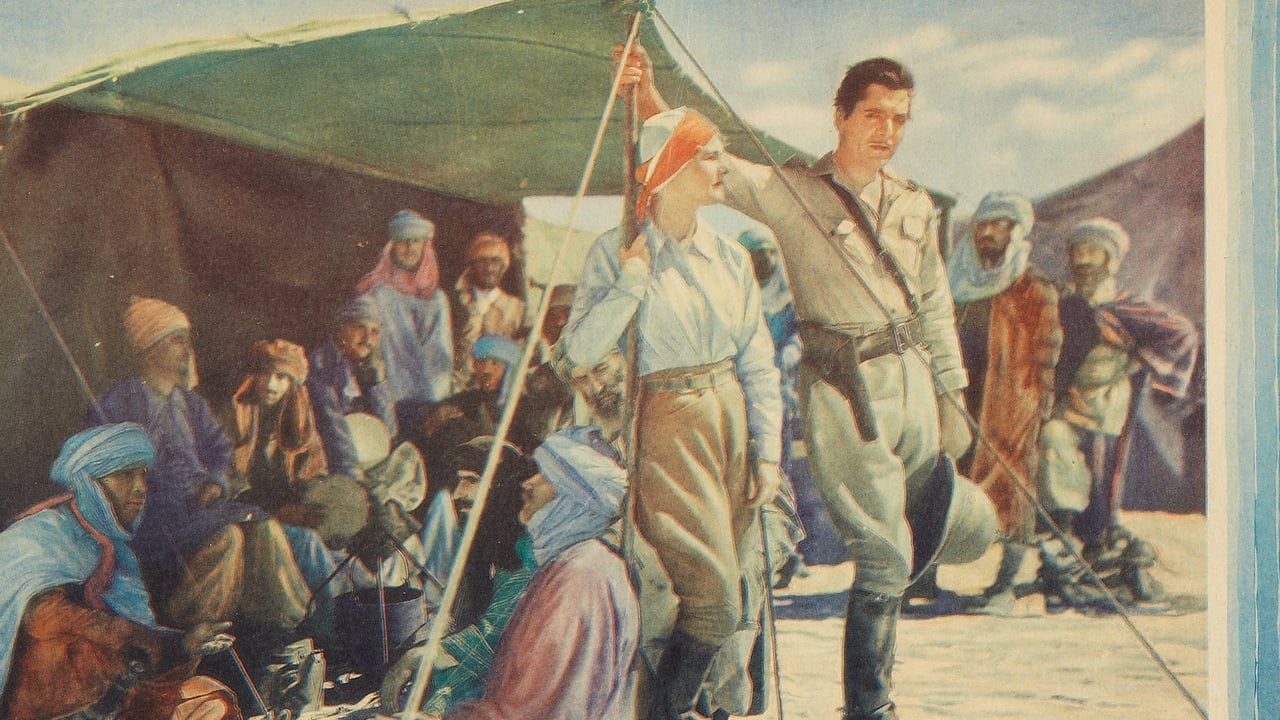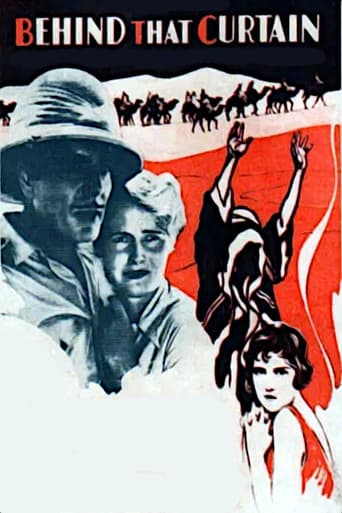

Too many fans seem to be blown away
... View MoreWatch something else. There are very few redeeming qualities to this film.
... View MoreIt really made me laugh, but for some moments I was tearing up because I could relate so much.
... View MoreI think this is a new genre that they're all sort of working their way through it and haven't got all the kinks worked out yet but it's a genre that works for me.
... View MoreSeeing this film was really fascinating because I seriously think it may be the first genuinely bad film ever made. It seemed like there was no such thing as a bad movie when they were this old, but I was proved wrong. I remember first reading about Charlie Chan in Leonard Maltin's Movie Guide. He eventually moved his reviews of it to his classic movie guide so I don't have much to go on from what I heard about it. The film is so strange as Charlie Chan doesn't appear until the last 12 minutes. Even then, he only has a few minutes of on screen! I believe this was the first Charlie Chan film made and was certainly a strange one.I have seriously never seen a older movie with a score of lower than 5.5 on the IMDb. I wish this had appeared on "Mystery Science Theater 3000" or maybe sometime on the new Rifftrax. I think this is also the longest Charlie Chan movie ever made and it really shows. This film for me was just boring. The acting wasn't good and the characters were pretty unlikeable. The women especially came off as really weak in this film. This is one of the earliest talkies I've seen in my life. I guess we've always had trouble with movies even back then. It's even hard to describe the plot. So little happens, you just don't even care what the story is.There's a murder mystery and someone is getting a divorce and they go to India or something? It was just very dull and uninteresting. Charlie Chan, for what very little screen time he has, is actually pretty good. I guess the film has significance, but it's still very unfulfilling. *1/2 out of ****.
... View More"Behind That Curtain" can be described in one word: agonizing.Some caveats. Historically it is wonderful to see. It is the sound debut of Boris Karloff and of Charlie Chan, who has a very small role in this.Back in 1929, actors were still learning how to handle talkies. It was an awkward time. The camera was stationary, for one thing.The style of acting was different, and so was the style of script."Behind That Curtain" is a good example of flowery, maudlin dialogue ("Do you know what it's like for a man like myself to envision you every night in that other tent? Looking upon the same desert?") and actors over-enunciating - worse than that, speaking slowly with huge pauses. "Did...you...find...any...thing." Also there was a lot of a dramatically stated "Do you mean..." without finishing the sentence -- usually regarding something sexual.In the story, a man hires a detective to investigate his niece Eve's (Lois Moran) fiancé Eric (Philip Strange). Her uncle believes he's only interested in her money. An old friend, John Beetham (Warner Baxter), who is in love with Eve himself, visits during this time. The detective is found dead. Eve and Eric marry anyway and move to India.It turns out uncle was right - Eric is a lazy brute who has moved his mistress/maid into the house and is constantly taking Eve's money. Desperate to get away from him, when John passes through India on an exploration, she begs him to take her along. Separate tents. The police haven't given up on the detective's murder, and they find Beetham to question him, and know that Eve is with him. Eve hides from them and then disappears, winding up in San Francisco. That's where Chan (E.L. Park) comes in.In the second part of the film, Lois Moran's rhythm picks up. Attractive and somewhat androgynous with her short haircut, she is an appealing actress saddled with over-dramatic speeches - I would love to see her in something else. Back then, Warner Baxter was tall and dapper, not the older, somewhat defeated personality of later years. He handles the dialogue pretty well, probably the best of everyone. Karloff plays his manservant and gets the big line "The desert gives and the desert takes away." Just know what you're in for if you decide to watch this. It's interesting to see how acting styles have changed since then, becoming much more subtle now, but also how someone like Baxter could seem more modern, as could Barrymore, Fairbanks Jr., and others.
... View MoreThis film is of historical interest, as the first appearance on film of the Charlie Chan character, even though he doesn't appear until about 50 minutes into the movie, and is in only 3 scenes. But as a movie, it is almost intolerably bad. The actors were obviously very unsure of themselves, making the transition from silent to sound movies. I've seen Warner Baxter in silent films, and he was by no means as frozen as he was in this movie. Now and then he relaxes, and his dialog becomes a bit more natural, as it would be a few years later in a film like "42nd Street". But here, he seems flummoxed by the need to actually MEMORIZE lines - there are several moments where he speaks hesitantly, for all the world as if he just couldn't remember the line, and can no longer just say whatever he wants, as one could in a silent film.Baxter is not the worst offender - the character of Mr. Galt (destined to play the melancholy role of "The Body") speaks so slowly and with such exaggerated pronunciation, is just terrible. Many of the actors appeared to be falling back on stage performance techniques, with loud emoting and over-enunciation, and as a result they over-powered the camera - or they would have, if their loud, artificial voices hadn't been combined with near-immobility. Everyone seems afraid to move - they plant themselves in one spot, then roar out their lines.The camera-work is also very unimaginative for the most part, with one notable exception - the camel caravan traveling over the desert was quite beautifully photographed. It's probably not a coincidence that the scene was purely visual - when the filmmakers could fall back on the more familiar silent movie techniques, they seemed much freer and imaginative. The new technology, by contrast, introduced awkwardness and seemed burdensome.The plot and the script were both very lame. The murderer is revealed very quickly, and mystery is replaced by a love triangle and a romance. Eve, the heroine, overacts horribly, with lots of head-bobbing and wriggling to convey her anguish. Her motivation is completely unbelievable - married to a murdering psychopath who has every reason in the world to kill her, she persists in fleeing from the police, and refusing to help convict him, even when her own life is at stake, and the police have hard evidence anyway, and there is no chance he can escape justice.The script does deserve some credit for treating a theme like adultery in a rather surprisingly hard-edged way. There's no softening of the despicable betrayal, or of the heroine's painful discovery that her husband has been sleeping with their Indian maid - she even finds the latter's earring in her own bed! She has her own moment of temptation later on, but resists with the time-honored line, "After all, he IS my husband!" It's a good reminder that the '20s were by no means a strait-laced decade - the tasteful expunging of sex in the movies came later. But then the movie ruins it by having Eve shrinking from divorcing her cad of a husband (one of my favorite lines, by the way: "Are-you-going-to------DIVORCE------me???") because she is afraid of the scandal. Divorce wasn't THAT big a scandal in the '20s, especially among the rich. Eve is always veering between put-upon, shrinking damsel in distress and unpredictable, capable woman on her own. The movie would have been far better if she had been portrayed as a strong, modern woman throughout, but that Eve would never have been so stupid and sentimental as to leave a murderer roaming the streets.
... View MoreAn international orientalizing romance mystery from the pen of Earl Derr Biggers, author of the Charlie Chan mysteries. Chan is not really in this movie, except indirectlyinstead there is a British-explorers-in-the-East theme, India and Persia and Tehran and pith helmets. Eve Mannering (Lois Moran) has married the wrong man, Durand (Philip Strange), who is a bounder and who has killed an agent, Hillary Galt, to prevent Eve's uncle from finding out. A watchman, blackmailing him, writes to Eve in India, and she confronts her husband, who hurts her and acts threatening, so she disappears into the desert with dashing, dependable Col Beetham (Warner Baxter) who has been longing for her all his life. Meanwhile, the urbane Scotland Yard detective Sir Frederick Bruce (Gilbert Emery) pursues the mystery with a clue provided by Chan, and the story winds up in San Francisco will all wrinkles ironed out. A very early sound movie, this one is marred not so much by the spotty sound recording as by the stagy acting style: thrilling and plummy tones ("ohhhhhhhhh Erik!") from Moran and Baxter. She's sometimes quite winsome, and Boris Karloff has a tiny part as Beetham's oriental servant. Later films focus on Chan, but not this one. Interesting use of title phrase, first to indicate why explorers explore, and then to preface Beetham's film-illustrated lecture at the denouement.
... View More